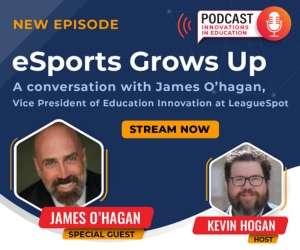
Key points:
Everyone had that favorite teacher; the one who inspired your confidence to succeed or fostered love of a certain subject. For me it was Ms. Pierre, my high school English teacher who embodied social-emotional mastery before there was such a thing. Her balanced approach of rigor and care created a nurturing environment where I felt supported. She tapped into my untapped potential, fostering a profound sense of self-belief and cultivating my passion for learning.
I often think about how our students’ futures would be different if more teachers were able to have such a connection with individual students, like I had with Ms. Pierre. Now I can make this a reality as district administrator for social emotional learning (SEL) for the Windsor Public Schools. Windsor puts a premium on SEL, hiring dedicated resources to support students and teachers, and transforming the educational experience with data.
Putting the resources in place
Under the leadership of our superintendent, Dr. Terrell Hill, Windsor has made a commitment to integrating SEL districtwide, and dedicating the resources to the social, emotional and educational growth of all our students, teachers, staff and families. His goal: Creating a place where all students graduate from school with the skills, attitudes, and values necessary to anchor their success in work, life, and their social-emotional well-being.
To ensure the success of this vision, it was critical to have key pieces in place. First, he established a unique position of administrator of SEL in the district’s executive suite. As the person in this role, I work hand-in-hand with our schools and teachers to ensure they have the tools and knowledge they need to recognize and address social-emotional concerns, apply SEL in their daily activities and support our overall efforts to enrich our school community. Then Dr. Hill invested in SEL specialists who work in all of our schools, from K-12. These individuals assist with interventions as needed and support programs and training to advance SEL in each school.
Why data matters
Perhaps the most innovative aspect of the program is our use of data to understand the impact of our SEL efforts and inform change that enables us to make our efforts more effective. To that end, we’ve implemented Devereux Student Strengths Assessment (DESSA), a nationally standardized, strength-based behavior rating scale for social and emotional competence. Data generated by this brief questionnaire helps our educators screen, assess, guide intervention planning, monitor progress and evaluate outcomes related to SEL.
Through DESSA data, we’ve become more intentional about aligning students with the support they need. We’ve added SEL specialists on staff at schools to work with individual students or small groups. And we’ve taken steps to help students improve self-awareness, foster peer-to-peer modeling, and engage in appropriate, positive interventions.
The three prongs to SEL success
Working with the students isn’t all we do. Effective social-emotional development requires a three-pronged approach that includes families and teachers. SEL doesn’t just live at school. Windsor Public Schools knew that for the work they were doing within school time to be long-lasting, they needed to get the larger Windsor area also to understand its importance to speed up development of social-emotional skills. The district encouraged parent-teacher home visits that focused on relationship building. Nothing was planned for these visits; we didn’t come with worksheets or anything; it was solely an opportunity to learn about the needs of our students’ families.
Classroom teachers perhaps play the most critical role. Teachers can model responsible decision making, positive relationship building and other important SEL skills in their everyday interactions. Plus SEL lessons can be naturally woven into the curriculum.
But using the DESSA data enables us to dig deeper to find out if our efforts are working, why some students continue to struggle, and how teachers can best reach them in the classroom. For example, one of our high schoolers, James, isn’t doing his assignments in World History class. The teacher knows he’s into basketball, so she reroutes him with differentiated learning. Instead of focusing on World War II, she has him research the history of Air Jordan shoes. By redirecting him with an assignment that piques his interest, the teacher helps James boost his confidence and understand that he is truly capable of doing the World History assignments. This same approach would work in other classes as well. In math, James could be tasked to analyze basketball stats, or in English, he could write an essay on his favorite athlete.
Even though this approach may seem like an inconvenience, and off track with curriculum and grading, it has a more important long-term benefit. James has been effectively redirected back to his classroom assignments, and proceeds with a greater sense of self-assurance and accomplishment.
We also leverage DESSA data for professional development (PD) to encourage more modern teaching practices that nurture stronger connections between teachers and students. We recently revamped these efforts, turning some PD’s into film sessions where we can review classroom interactions and teaching strategies. During these sessions, teachers and district leaders are able to meet in mini groups to discuss the approaches shown and how they may have handled the situation differently. The interactive discussions help our professionals develop new strategies to align themselves to the needs of their students.
Over the last couple of years, Windsor has made remarkable strides in its implementation of SEL, as demonstrated by the compelling data trends. With keen attention to the SEL needs of its students, Windsor has shown an impressive uptick in the proportion of students exhibiting typical to strong SEL abilities. In one academic year, Windsor witnessed impressive progress, with over 88 percent of students showing positive growth in one or more SEL skills, exceeding the previous year’s 79 percent. Notably, 32 percent of students excel in all five core SEL competencies, surpassing the national average by 16 percent. This outstanding achievement showcases the effectiveness of our SEL interventions.
By measuring the right metrics, we can empower teachers to embody the qualities of exceptional educators like Ms. Pierre. Her masterful integration of SEL competencies and her ability to lead with both rigor and compassion set her apart. We must support and provide educators with the tools necessary to create meaningful connections for students to thrive.
Results at Windsor show that transformative change is possible when the right pieces are put in place. Leveraging DESSA helps our district take a data-driven approach and gather insights that can be put into action. Having dedicated resources – from an advocate in the executive suite to addition of SEL support staff and targeted PD in each school – Windsor gives schools the tools they need to effectively address shortcomings and build an environment where students will have more than just one favorite teacher who influences their lives for years to come.
- SEO Powered Content & PR Distribution. Get Amplified Today.
- PlatoData.Network Vertical Generative Ai. Empower Yourself. Access Here.
- PlatoAiStream. Web3 Intelligence. Knowledge Amplified. Access Here.
- PlatoESG. Carbon, CleanTech, Energy, Environment, Solar, Waste Management. Access Here.
- PlatoHealth. Biotech and Clinical Trials Intelligence. Access Here.
- Source: https://www.eschoolnews.com/sel/2024/01/16/data-empowers-district-sel-student-needs/
- :has
- :is
- :where
- $UP
- 11
- 16
- 22
- 32
- a
- abilities
- ability
- Able
- About
- academic
- achievement
- Action
- activities
- added
- addition
- address
- advance
- advocate
- AIR
- align
- aligning
- All
- also
- an
- analyze
- Anchor
- and
- anything
- apart
- Apply
- approach
- approaches
- appropriate
- ARE
- AREA
- AS
- aspect
- assess
- assessment
- assist
- At
- Athlete
- attention
- author
- average
- back
- Balanced
- Basketball
- BE
- become
- been
- before
- behavior
- benefit
- BEST
- between
- boost
- both
- build
- Building
- by
- CAN
- capable
- care
- certain
- change
- class
- classes
- classroom
- come
- commitment
- community
- compelling
- Concerns
- confidence
- connection
- Connections
- continue
- contributors
- Coordinator
- Core
- could
- Couple
- create
- created
- Creating
- critical
- Curriculum
- daily
- data
- data-driven
- decision
- Decision Making
- dedicated
- deeper
- demonstrated
- description
- develop
- Development
- different
- differentiated
- differently
- DIG
- discuss
- discussions
- district
- do
- Doesn’t
- doing
- dr
- during
- each
- educational
- educators
- Effective
- effectively
- effectiveness
- efforts
- embody
- empower
- empowers
- enables
- encourage
- encouraged
- end
- engage
- English
- enrich
- ensure
- Environment
- ESSAY
- established
- evaluate
- everyday
- example
- Excel
- exceptional
- executive
- Exhibiting
- experience
- families
- Favorite
- felt
- Film
- Find
- First
- five
- focused
- focusing
- For
- Foster
- fostered
- fostering
- from
- Futures
- gather
- generated
- get
- gives
- goal
- graduate
- greater
- Group’s
- Growth
- guide
- had
- Have
- having
- he
- help
- helps
- her
- High
- him
- Hiring
- his
- history
- Home
- How
- http
- HTTPS
- i
- if
- ii
- Impact
- implementation
- implemented
- importance
- important
- impressive
- improve
- in
- In other
- includes
- individual
- individuals
- inform
- innovative
- insights
- inspired
- instead
- Integrating
- integration
- Intentional
- interactions
- interactive
- interest
- intervention
- interventions
- into
- invested
- IT
- ITS
- james
- Jordan
- just
- just one
- Keen
- Key
- knowledge
- knows
- larger
- Last
- lead
- leaders
- Leadership
- LEARN
- learning
- Lessons
- Leverage
- leveraging
- Life
- like
- live
- Lives
- long-term
- love
- made
- make
- Making
- mastery
- math
- May..
- me
- meaningful
- measuring
- Media
- Meet
- Metrics
- Michael
- model
- modeling
- Modern
- Monitor
- more
- most
- MS
- must
- my
- National
- nationally
- necessary
- Need
- needed
- needs
- New
- notably
- note
- nothing
- now
- nurture
- nurturing
- of
- off
- often
- on
- ONE
- Opportunity
- or
- Other
- our
- out
- outcomes
- outstanding
- over
- overall
- passion
- peer to peer
- percent
- perhaps
- person
- pieces
- Pierre
- Place
- planned
- planning
- plato
- Plato Data Intelligence
- PlatoData
- Play
- plus
- points
- position
- positive
- possible
- Posts
- potential
- practices
- Premium
- previous
- proceeds
- professional
- professionals
- profound
- Program
- Programs
- Progress
- proportion
- provide
- public
- put
- Puts
- qualities
- rating
- reach
- Reality
- recently
- recognize
- related
- relationship
- remarkable
- requires
- research
- Resources
- responsible
- review
- right
- Role
- same
- Scale
- School
- Schools
- Screen
- seem
- Self-Awareness
- self-belief
- sense
- sessions
- set
- she
- shortcomings
- show
- showing
- shown
- situation
- skills
- small
- So
- Social
- solely
- some
- specialists
- speed
- Staff
- standardized
- stats
- Steps
- strategies
- strengths
- strides
- strong
- stronger
- Struggle
- Student
- Students
- subject
- succeed
- success
- such
- suite
- support
- Supported
- surpassing
- Take
- taken
- Tapped
- targeted
- teacher
- teachers
- Teaching
- than
- that
- The
- the world
- their
- Them
- themselves
- then
- There.
- These
- they
- thing
- think
- this
- though?
- three
- Thrive
- time
- to
- tools
- track
- Training
- transformative
- transforming
- Trends
- truly
- Turning
- typical
- understand
- unique
- untapped
- us
- use
- using
- Values
- vision
- Visits
- war
- was
- we
- WELL
- were
- when
- WHO
- why
- will
- Windsor
- with
- within
- witnessed
- Work
- working
- world
- would
- woven
- write
- year
- years
- Your
- zephyrnet











